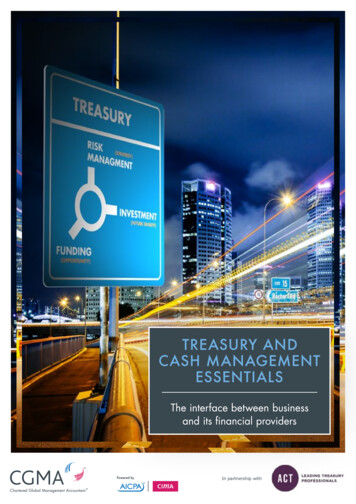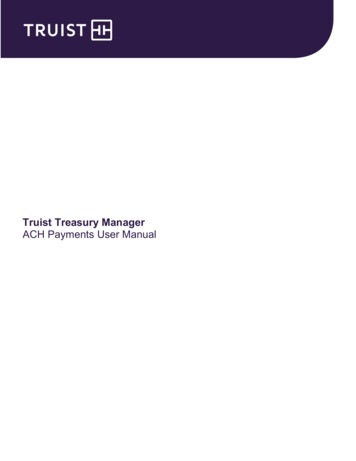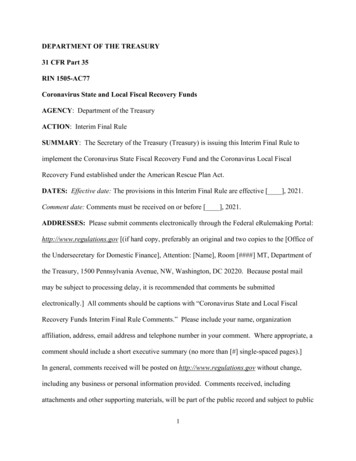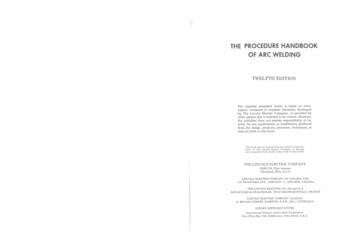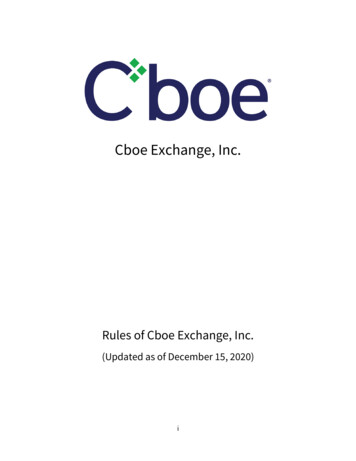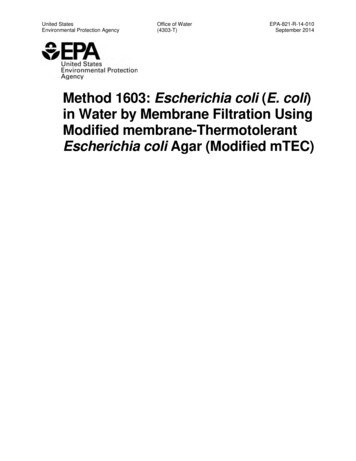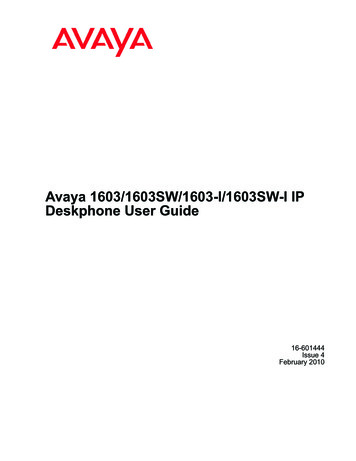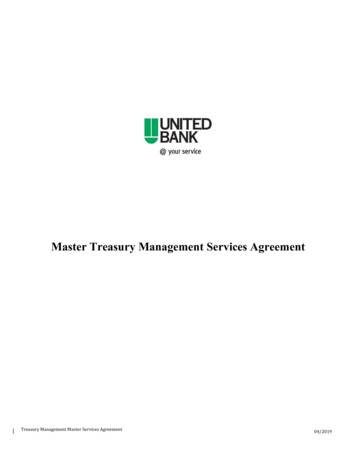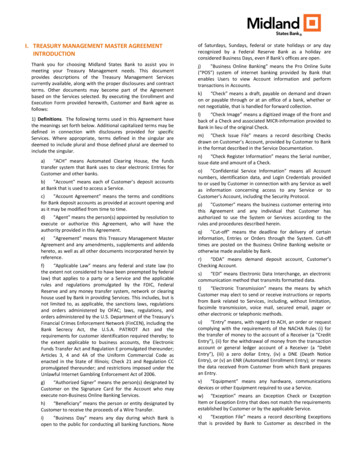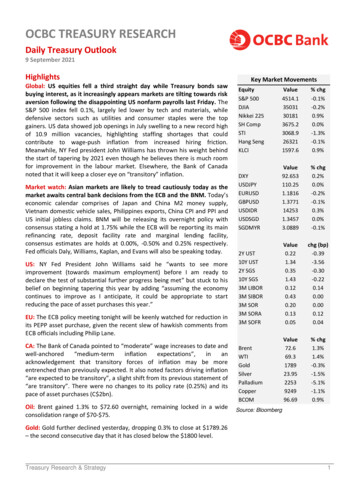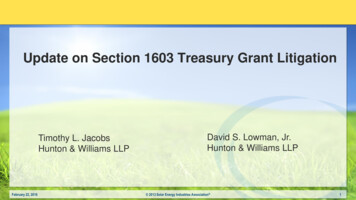
Transcription
Update on Section 1603 Treasury Grant LitigationTimothy L. JacobsHunton & Williams LLPFebruary 22, 2016David S. Lowman, Jr.Hunton & Williams LLP 2013 Solar Energy Industries Association 1
Update on Section 1603 Treasury Grant LitigationBackground on Section 1603 Grants Enacted in Section 1603 of the American Recovery and Reinvestment Tax Act of 2009 10% or 30% cash grant is provided for renewable energy facilities in lieu of ITC or PTC Facility must be placed in service in 2009, 2010 or 2011, or Facility can be placed in service after 2011 if construction began in 2009-2011 Solar, wind, biomass, geothermal, hydropower, landfill gas, trash, fuel cell, microturbine, andCHP, marine and hydrokinetic facilities. Application process. Applicants who receive a cash grant cannot also claim ITC or PTC Cash grant only available for property used in a trade or business or for the production of incomeFebruary 22, 2016 2013 Solar Energy Industries Association 2
Update on Section 1603 Treasury Grant LitigationAdministration of Grant Program U.S. Department of Treasury, Office of the Fiscal Assistant Secretary(Treasury), administers the Grant Program.– Program Manager– Fiscal Affairs Specialist– Treasury’s General Counsel Neither the Office of Tax Policy nor the IRS are directly engaged inthe administration of the Grant Program.February 22, 2016 2013 Solar Energy Industries Association 3
Update on Section 1603 Treasury Grant LitigationAdministration of Grant Program Treasury has contracted with the National Renewable EnergyLaboratory (NREL) to perform the review of grant applications.––––Section 1603 Review Team (assembled from outside NREL)Primary ReviewerSecondary ReviewerSenior Reviewer Recommendations to Treasury Approval of awards by TreasuryFebruary 22, 2016 2013 Solar Energy Industries Association 4
Update on Section 1603 Treasury Grant LitigationStatus of Section 1603 Grant Program- As of Sept. 30, 2012 cut-off, 210,000 applications.- Total of approx. 34 billion dollars estimated.- As of early 2015, half of applications reviewed.February 22, 2016 2013 Solar Energy Industries Association 5
Update on Section 1603 Treasury Grant LitigationPrincipal Areas of Dispute Qualified property. Whether property is integral to the electricitygenerating activity. Eligible cost basis. Whether any portion of the cost basis is allocableto a non-qualifying activity or a non-qualifying intangible asset.Direct/indirect cost capitalization issues. Valuation/Structural issues. Whether the purchase price representsan arm’s length value, is consistent with “open market expectations,”or is subject to “peculiar circumstances”; related-party costs;development fees and mark-ups; sale-leaseback arrangements;inverted lease structures.February 22, 2016 2013 Solar Energy Industries Association 6
Update on Section 1603 Treasury Grant LitigationBasics of Litigating Section 1603 Treasury Grant Matters Jurisdiction in the Court of Federal Claims.Claims are based on the Tucker Act (28 U.S.C. § 1491(a)(1)).Statute of Limitations: 6 years from the date the claim arises.Open question regarding interest recovery (see 28 U.S.C. § 2516).Open question regarding effect of sequestration.United States is represented by Department of Justice. Civil Division. Tax Division. Flexible consolidation of cases with similar issues. Judges not bound by other judges’ holdings. Appeals to U.S. Court of Appeals for the Federal Circuit.February 22, 2016 2013 Solar Energy Industries Association 7
Update on Section 1603 Treasury Grant LitigationRunning Tally of 1603 Lawsuits There are more than 20 lawsuits that have been filed against the US TreasuryDepartment in the US Court of Federal Claims. These cases include:ARRA Energy Co., I et al.Clean Fuel, LLCLCM Energy SolutionsNevada Controls, LLCW.E. Partners II, LLCSequoia Pacific Solar I, LLCAlta Wind I Owner-Lessor C, et al.Blue Heron Properties, LLCRP1 Fuel Cell LLC, et al.Windpower Partners 1993, LLCVasco Winds, LLCCalifornia Ridge Wind Energy LLCBishop Hill Energy LLCFire Island Wind, LLCAmpersand Chowchilla Biomass, LLCGUSC Energy, LLCGenesis Solar, LLCMeadWestvaco Corp.Nippon Paper Industries USA, Co., Ltd.
Update on Section 1603 Treasury Grant LitigationGeneral Guideposts Some general guideposts have developed.–––––Jurisdiction – Court of Federal Claims & Tucker Act.Nature of case – money-mandating grant case.Scope of damages – no consequential damages.Standard of review – de novo.Deference to Treasury Guidance.February 22, 2016 2013 Solar Energy Industries Association 9
Update on Section 1603 Treasury Grant Litigation ARRA Energy CompanyARRA Energy Company I et al. v. United States, No. 10-84C.First case filed in Court of Federal Claims in February 2010.Multiple mobile solar power generating systems.Grants denied on basis that cost basis not established.Government moved to dismiss case on jurisdictional grounds.Court of Federal Claims issued opinion in January 2011,holding it had jurisdiction because Section 1603 is a “moneymandating source of law” under the Tucker Act.Case later dismissed after Government raised fraud claims.February 22, 2016 2013 Solar Energy Industries Association 10
Update on Section 1603 Treasury Grant LitigationLCM Energy Solutions LCM Energy Solutions, No. 12-321C. Treasury reduced grants for 18 solar systems on the ground that the costbasis was higher than open market expectations. Applicant sought (i) fullamount of grant and (ii) consequential damages. Court held that Applicant is not entitled to consequential damages. Court stated that Section 1603 contains:“a ‘clear standard for the payment of money and states a precise amount of money tobe paid.’ . . . This precision cannot be ‘fairly interpreted’ as mandating payment ofanything beyond the exact amount of the full amount of the grant to which a givenplaintiff may be entitled, much less the highly amorphous and subjective category ofconsequential damages.” See also Clean Fuel LLC, No. 12-79T (same holding).February 22, 2016 2013 Solar Energy Industries Association 11
Update on Section 1603 Treasury Grant LitigationW.E. Partners II, LLC W.E. Partners II, LLC, No. 13-54. Section 1603 cases handled in same manner as tax refund suits. “In tax refund suits, the Court reviews claims de novo, and the plaintiff bears theburden of proof for each claim.” Bishop Hill Energy LLC, 14-251C: Applying de novo review to limit discovery ofGovernment information and documents. Four effects:––––No administrative deference. Treasury cannot rely on administrative determinations.Administrative proceedings at Treasury are not relevant either to Treasury or applicants.Limited discovery of Treasury and Government.Case tried and decided on clean slate, and not on basis of administrative record.February 22, 2016 2013 Solar Energy Industries Association 12
Update on Section 1603 Treasury Grant LitigationW.E. Partners II, LLC Regulatory Deference Principles. Even though the government did not argue fordeference, the Court of Federal Claims concluded that the TreasuryDepartment’s interpretation of Section 1603 in the Treasury Guidance wasentitled to “considerable weight as a reasonable interpretation of the statute andreasonable limitation consistent with the intent of Congress.” Applicants may argue same deference principles against Treasury -- TreasuryGuidance generally favorable to applicants. Regulatory deference vs. administrative deference.February 22, 2016 2013 Solar Energy Industries Association 13
Update on Section 1603 Treasury Grant LitigationCase Notes W.E. Partners, II, LLC, No. 13-54. Decided on summary judgment against applicant. Involveseligible cost basis question related to use of thermal energy in cogeneration biomass plant.Federal Circuit recently affirmed. RP1 Fuel Cell LLC, et al., No. 13-552C. First Section 1603 case to go to trial; decided in favor ofapplicant. Involves qualified property question with respect to gas conditioning equipment usedto treat anaerobic digester gas for fuel cell power plants. On appeal to Federal Circuit. Vasco Winds, LLC, No. 13-697C. Involves NextEra wind project. Question whether cost basisreflects “open market expectations” and related-party costs. Case settled on undisclosed terms. Fire Island Wind, No. 14-403T. Involves permit-related costs for navigational aid facility (FAA).Case recently settled. Genesis Solar, No. 15-268T. First commercial scale solar facility in litigation. Qualified propertyissues: Auxiliary equipment, dual-use equipment, wind fencing, groundwater wells, permittingcosts, and land mitigation.February 22, 2016 2013 Solar Energy Industries Association 14
Update on Section 1603 Treasury Grant LitigationMajor Cases Two of the major cases are going to trial this year.– Sequoia Pacific Solar I, LLC, et al., No. 13-139C. Resi-solar valuation issues. Fact discovery completed 10/09/15; expert discovery due 02/17/16 Trial not scheduled; likely later this year.– Alta Wind I Owner-Lessor C, et al., No. 13-402T et al. Sale-leaseback, valuation, intangible assets, “peculiar circumstances” at issue. Three-week trial scheduled to begin on 05/09/16.February 22, 2016 2013 Solar Energy Industries Association 15
Update on Section 1603 Treasury Grant LitigationSequoia Pacific Solar Sequoia Pacific Solar I, LLC, et al., No. 13-139C. Sequoia Pacific submitted applications for 189 residential and commercialsolar energy projects based on the purchase price paid for the projects, assupported by independent appraisals.– Sale-leasebacks. The co-plaintiff Eiger Lease Co., LLC, submitted applications with respectto 4,015 residential solar energy projects.– The Eiger applications involved the lease of projects in which the grantswere “passed-through” to the lessee entities. Treasury reduced the grant awards to Sequoia Pacific based on thebenchmarks that Treasury adopted for solar systems.February 22, 2016 2013 Solar Energy Industries Association 16
Update on Section 1603 Treasury Grant LitigationSequoia Pacific Solar Complaint filed February 2013. Gov’t. filed motion to dismiss on the basis that Complaint requests AdministrativeProcedure Act-like review of Treasury administrative process: “[W]hat we haveis a complaint that reads to us as an APA complaint.” Court declined to dismiss. Sparring over discovery and confidentiality issues over course of 2 years.– SP’s Motion to Compel Production and Interrogatory Responses. Granted in part, denied in part.– Govt’s Motion to Retain Confidentiality. Granted: “The agency has persuaded the court that it has an interest in keepingconfidential, for example, thresholds and benchmarks amounts and how they arecalculated.”February 22, 2016 2013 Solar Energy Industries Association 17
Update on Section 1603 Treasury Grant LitigationSequoia Pacific Solar Judge Bruggink (hearing on SP’s motion to compel):“Well, here’s about the deal let me see if I can articulate what I’m pondering, certainly what, whathappened to the plaintiffs’ applications in fact is 100% fair game. I’m inclined to think that what thebenchmarks were is fair game over time. And I’m inclined to think that when the benchmarks are higherthan what the plaintiff received, it creates an automatic assumption that the development of that benchmarkwould be relevant for the plaintiff to hear them out. Beyond that, sort of doing an autopsy after the fact ofhow the Government developed its approach to this program strikes me as such a large undertaking and and that the vast bulk of which would be irrelevant at trial that I prefer to do this probably in stages.”February 22, 2016 2013 Solar Energy Industries Association 18
Update on Section 1603 Treasury Grant LitigationSequoia Pacific Solar October 6, 2014 Order re SP’s Motion to Compel Production:– Gov’t must produce documents sufficient to identify the Benchmark or Threshold amountsthat were used by Treasury or NREL in evaluating Section 1603 applications for solarphotovoltaic properties from the inception of the Section 1603 Program.– Where, on the date of submission of any of plaintiffs’ Section 1603 applications at issue in thislawsuit, Treasury's or NREL's Benchmark or Threshold amount was, on a per-watt basis,higher than the per-watt amount upon which Treasury based the Section 1603 award withrespect to that application, Defendant shall produce documents sufficient to identify how thatBenchmark or Threshold amount was derived.– Gov’t must produce all documents and information upon which Treasury or NREL relied inreviewing or evaluating plaintiffs’ Section 1603 applications, including but not limited to anydocuments or information submitted by third parties pursuant to the Section 1603 Programthat were relied upon in whole or in part for that purpose.February 22, 2016 2013 Solar Energy Industries Association 19
Update on Section 1603 Treasury Grant LitigationAlta Wind Alta Wind I Owner-Lessor C, et al., No. 13-402T et al.20 plaintiffs totalSale-leaseback transactions involving wind projects 226 million in grant funds at issueFirst case filed in June 2013; later consolidated with other Alta Wind casesUnderlying dispute in the case is focused on the proper cost basis for the wind energyproperty for grant purposes. Treasury claims “peculiar circumstances” with respect tosale-leaseback transactions Plaintiffs filed summary judgment motion on grounds that purchase price paid in saleleaseback transactions was determinative Gov’t filed request to stay summary judgment motions until completion of discovery Court granted Gov’t request and stayed proceedings pending completion of discovery.Court held that Gov’t entitled to full discovery
Update on Section 1603 Treasury Grant LitigationAlta Wind There are four main points in the Court’s analysis.First:– The parties agreed that as a general rule the buyer’s cost basis is equal to the property’s purchaseprice. Likewise, it was undisputed that this general rule is not applicable “if the transaction in questionwas ‘not conducted at arm’s-length by two economically self-interested parties’ or was based upon‘peculiar circumstances’ that contributed to a price inflated above the property’s fair market value,”citing Lemmen v. Comm’r, 77 T.C. 1326, 1347-48 (1981).– The Court further suggested that a sale-leaseback transaction may qualify as “‘peculiar circumstances.’”– The Court noted that “a sale-leaseback agreement’s potential for value transfers across transactionsmirrors the value shifts found in Lemmen, where the US Tax Court found ‘peculiar circumstances’ werepresent.”– The Court agreed with the government that the sale-leaseback transaction “provides the opportunity toadjust terms to yield a higher purchase price without lowering the buyer’s targeted return oninvestment.”February 22, 2016 2013 Solar Energy Industries Association 21
Update on Section 1603 Treasury Grant LitigationAlta WindSecond:– The Court observed that even if no “peculiar circumstances” exist, “the Court cannot apply the generalrule for determining cost basis unless the purchase price comprises only eligible assets. In accordancewith the Recovery Act, Treasury issues cash grants to applicants only for their grant-eligible property,denoted as ‘specified energy property.’”– Because the court found that it was unclear whether the plaintiffs purchased only eligible property, thecourt determined full discovery was permitted on that basis alone.– This discovery would include the plaintiffs’ detailed work papers, accounting records and calculationsused in developing its cost schedules.– The Court was not persuaded that discovery was not appropriate on the basis that Treasury had anopportunity to look into cost basis and was provided more than 10,000 pages in supportingdocumentation.– The Court stated: “In short, a claim of this size demands that both parties have access to the underlyingcalculations to ensure that the Court considers the correct valuations.”February 22, 2016 2013 Solar Energy Industries Association 22
Update on Section 1603 Treasury Grant LitigationAlta WindThird:– The Court agreed with the government with respect to its entitlement to discovery of theapplicants’ appraisals.– The Court stated: “The facts strongly suggest that the appraisal values dictated purchase price amounts, assome purchase prices are exactly equal to the appraised values. Indeed, stilted appraisalmethods that comport with other evidence of value shifting would engender a genuineissue of material fact, and this precludes a grant of summary judgment.” “Due to the fact that Plaintiffs considered the appraisal results in allocating the purchaseprice among the acquired assets, discovery of the appraisal methodology andconclusions also is necessary.”February 22, 2016 2013 Solar Energy Industries Association 23
Update on Section 1603 Treasury Grant LitigationAlta WindFourth:– The Court agreed with the Gov’t that any existing goodwill or going concern values must besubtracted from the purchase price because those items are not qualifying under Section1603. The Court agreed that the Gov’t must have full discovery to identify the amount of thepurchase price that constitutes goodwill and going concern value. Any existing goodwill or going concern values must be subtracted from the purchaseprice, as neither of these qualifies as eligible property. The total purchase price cannot serve as the cost basis where Treasury Regulation §1.1060-1 requires an allocation of an amount of the purchase price to goodwill and goingconcern value. This determination requires consideration of “all the facts and circumstances surroundingthe transaction.February 22, 2016 2013 Solar Energy Industries Association 24
Update on Section 1603 Treasury Grant LitigationAlta Wind Complaint filed June 2013. Sparring over discovery and timing.– Gov’t Motion for Enlargement of Time to Complete Discovery. “Plaintiffs’ requests were incredibly broad and sought a great deal of information that isirrelevant to the Court’s determination of the issues in this de novo proceeding.” Granted in part, denied in part.– AW’s Motion to Compel Production of Documents. Treasury communications withheld under deliberative process privilege. Privilege log. Apr. 2, 2015 Deposition of Edward Settle; Apr. 15, 2015 Deposition of Judson Jaffe. Court granted motion with respect to final pre-award documents; denied motion withrespect to draft pre-award documents and non-final deliberations at Treasury.– Feb. 8, 2016 opinion permitting Government to file counterclaims.February 22, 2016 2013 Solar Energy Industries Association 25
Update on Section 1603 Treasury Grant LitigationTimothy L. JacobsHunton & Williams LLP202-955-1669tjacobs@hunton.comFebruary 22, 2016David S. Lowman, Jr.Hunton & Williams LLP202-419-2070dlowman@hunton.com 2013 Solar Energy Industries Association 26
Update on Section 1603 Treasury Grant Litigation Background on Section 1603 Grants Enacted in Section 1603 of the American Recovery and Reinvestment Tax Act of 2009 10% or 30% cash grant is provided for renewable energy facilities in lieu of ITC or PTC Facility must be placed in service in 2009, 2010 or 2011, or Facility can be placed in service after 2011 if construction began .

